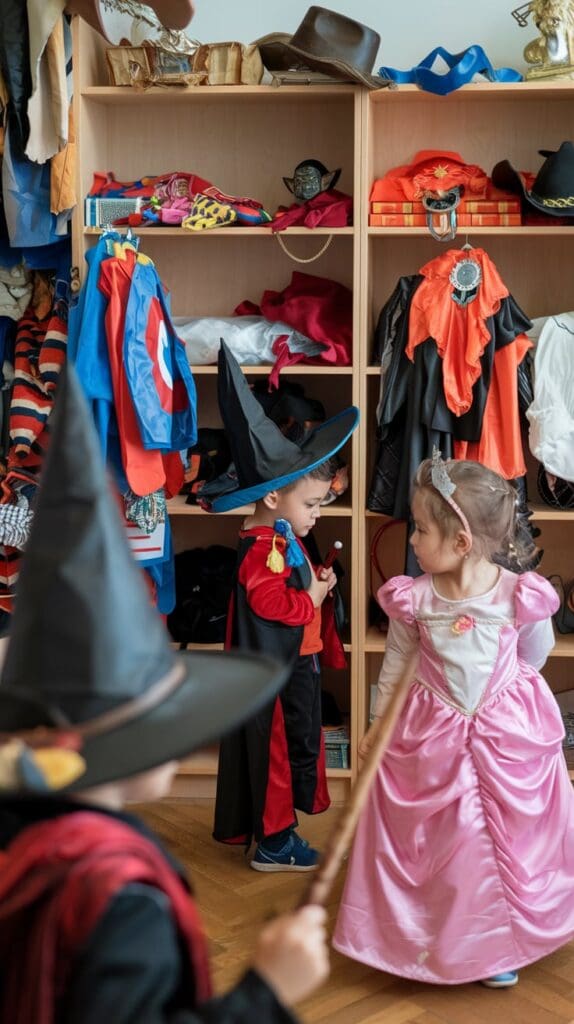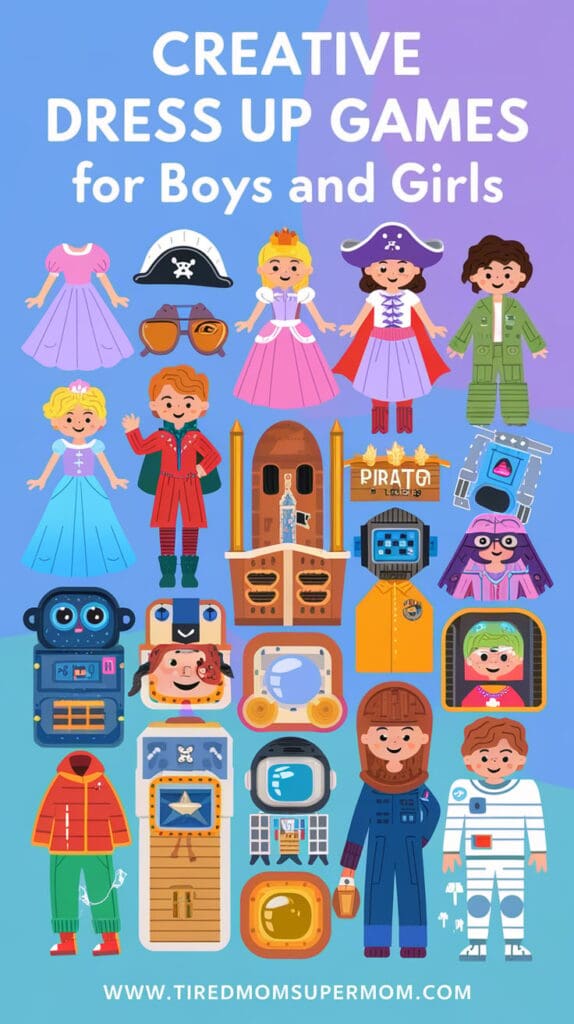Dress Up Games for Kids: 25+ Creative Role Play Ideas for Boys and Girls
Looking for fun and screen-free ways to spark your child’s imagination? Dress up games for kids are one of the best tools for pretend play—and they’re just as exciting for boys as they are for girls. Whether your little one dreams of being a firefighter, superhero, fairy, or vet, there’s something magical about slipping into costume and becoming someone new.
In this post, you’ll find over 25 creative dress up game ideas for kids of all ages, from toddlers to tweens. These playful activities promote social-emotional skills, boost confidence, and offer hours of imaginative fun—without a screen in sight!
Heads up: This post may include affiliate links. As an Amazon Associate, I earn from qualifying purchases—at no extra cost to you. Full privacy policy and disclosure here.

Why Dress Up Games for Kids Matter
Before we dive into the dress up game ideas, let’s talk about why this kind of play is so valuable.
- Boosts imagination – Kids create characters, worlds, and storylines from scratch.
- Encourages empathy – Taking on different roles helps kids understand others’ feelings and perspectives.
- Builds vocabulary and storytelling – Pretend play sharpens communication skills and expressive language.
- Improves problem-solving – Working through pretend scenarios builds critical thinking.
According to Zero to Three, pretend play, including dress up, is a powerful tool for healthy brain development.
The Ultimate List of Dress Up Games for Kids
These dress up activities can be played solo, with siblings, or even with friends during a playdate or party.
1. Community Helpers Game
Let kids pretend to be firefighters, police officers, doctors, or mail carriers. Set up stations with props and let them “respond” to emergencies or deliver letters!
👉 Try this Doctor Kit Play Set
2. Costume Fashion Show
Set up a mini runway and let the kids strut their stuff in various costumes. Let them explain their character before walking the runway!
3. Fairy Tale Dress Up Adventure
Provide princess gowns, knight armor, and dragon wings. Reenact stories like Cinderella, Sleeping Beauty, or Jack and the Beanstalk.
👉 This Knight & Princess Costume Set is a favorite on Amazon!
4. Pirate Treasure Hunt
Let the kids dress as pirates and follow a “treasure map” around the house or backyard.
👉 Use this Pirate Role Play Kit
5. Superhero Headquarters
Assign superhero names and powers. Kids can create missions to save stuffed animals or protect the living room “city.”
6. Animal Safari
Provide animal ears and tails, and let kids prowl around as lions, tigers, elephants, and zebras. Have an “animal parade” at the end.
👉 These Plush Animal Dress Up Headbands are great for group play.
7. Career Day Role Play
Let your kids dress up as a chef, construction worker, teacher, or scientist. Pair the costumes with real or toy tools and act out daily routines.
8. Royal Kingdom Drama
Assign royal roles—King, Queen, Jester, Knight—and encourage kids to put on a royal performance.
9. Dinosaur Explorer Game
Let one child play the paleontologist and the others act as dinosaurs. Create a “dig site” using sensory bins and sand.
10. Outer Space Adventure
With astronaut suits and alien masks, kids can blast off to faraway planets.
👉 Check out this NASA Astronaut Costume
More Dress Up Game Ideas
To meet the needs of different personalities and play styles, here are more dress up game options:
- Vet Clinic Role Play
- Hairstylist Salon
- Haunted House Dress Up
- Seasonal Themes (Snowman, Pumpkin, Leprechaun)
- Wizard School (inspired by Harry Potter)
- Circus Dress Up (Ringmaster, Clown, Acrobat)
- Mythical Creatures Play (Unicorns, Dragons, Mermaids)
- Spy Mission Game
- Time Travel Adventure (Ancient Egypt, 80s fashion, Medieval times)
- TV Show Recreation (Bluey, Paw Patrol, etc.)
Want even more play ideas? Don’t miss our post on 7 Imagination Games for Toddlers!
How to Set Up a Dress Up Station at Home
You don’t need a Pinterest-worthy setup—just a few essentials to make a DIY costume corner fun and functional:
- Large storage bin or dress-up rack
- Costumes from thrift stores or old Halloween outfits
- Accessories like hats, scarves, glasses, and gloves
- Mirror at kid-height for full effect
- Reusable labels or signs for sorting roles (e.g., Animals, Superheroes)
Bonus tip: Add a clipboard and play phone for a pretend “receptionist” or “boss” role!
Learning Through Dress Up Play
Dress up games for kids aren’t just fun—they support developmental milestones. When kids role-play:
- They learn to share and take turns
- Develop executive functioning (planning and organizing play)
- Practice language development
- Explore real-world jobs and roles
This is especially beneficial in early years, as discussed in our post: Why Having Fewer Toys Is Best for Kids.
Toys and Accessories to Enhance Dress Up Games
Here are some of the top-rated items on Amazon to make your dress up games even more exciting:
- 🎭 Melissa & Doug Role Play Costume Set
- 🕵️ Detective Spy Kit for Kids
- 🐴 Animal Dress Up Set – 10 Costumes
- 🌈 Rainbow Fairy Wings and Wand Set
- 👨🍳 Chef Hat and Apron Costume
Dress Up Party Ideas for Extra Fun
Planning a birthday or playdate? Try a theme where everyone comes in costume and participates in role play games.
- Superhero Academy
- Princess Training School
- Dinosaur Dig Day
- Animal Rescue Party
- Circus Camp
Don’t forget to set up a photo booth with props!
Related Content You’ll Love
- 🎲 Best Board Games for 2-Year-Old Toddlers
- 💞 Sharing Activities for Kids
- 🧠 Imagination Games for Toddlers
✨ FAQ: Dress Up Games for Kids
Are dress up games for kids only for girls?
Not at all! Boys and girls both benefit from imaginative play. Offer a variety of costumes like superheroes, animals, doctors, and chefs to include everyone’s interests.
What age is appropriate for dress up games?
Kids can begin dress up games as early as 18 months with simple hats or scarves. Preschoolers and elementary-aged kids love more complex role play.
How do I organize dress up clothes?
Use a low clothing rack, labeled bins, or over-the-door organizers. Keep accessories in baskets or zippered bags for easy access.
Can dress up games support learning?
Yes! These games develop vocabulary, storytelling, cooperation, and problem-solving. They’re also great for social-emotional development.
Where can I find affordable dress up items?
Check Amazon (linked above), thrift stores, or clearance after Halloween. You can even repurpose adult clothes like old button-down shirts or costume jewelry.
Conclusion: Dress Up Games for Kids Spark Lasting Joy
Whether you’re putting together a rainy-day activity or building a playroom costume corner, dress up games for kids offer more than fun—they support creativity, confidence, and connection. With a little planning and a few key pieces, your child can be anything they imagine!
📌 Love these ideas? Pin this post so you can come back anytime for inspiration!

💬 Have a favorite dress up game or costume idea? Leave a comment below—I’d love to hear what your little ones enjoy most!
